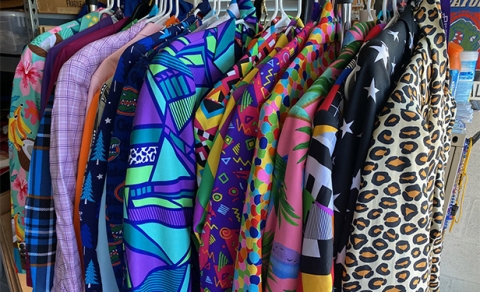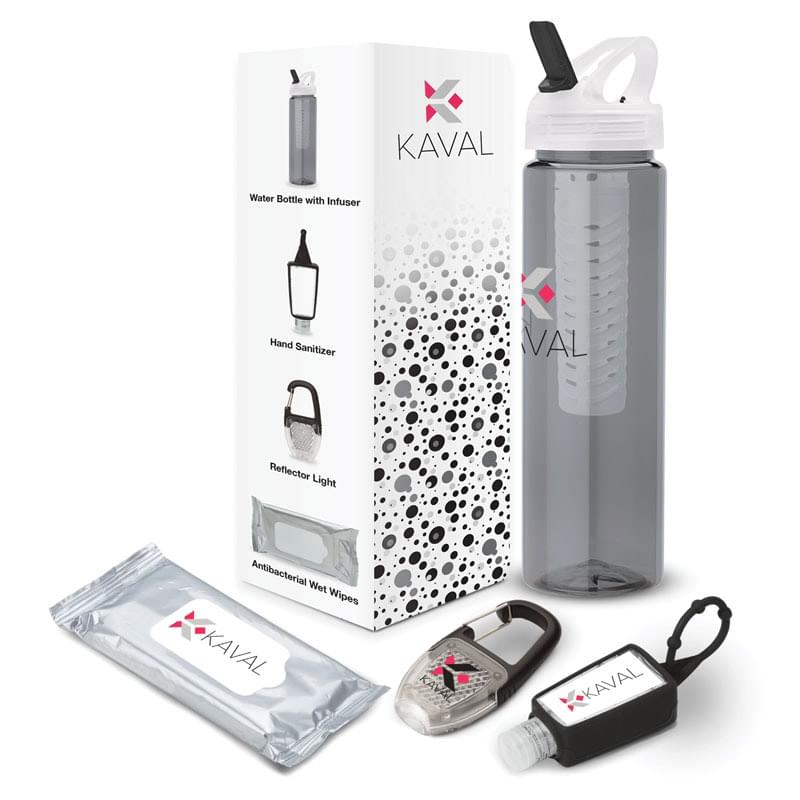How and Why Event Swag Is Starting to Make a Comeback

If a booth stacked with free knickknacks to take home is Exhibit A that trade shows are bouncing back, then PMSI Promos President Marty Bear’s hotel closet is a close second. When there is a rainbow of suits ready to be trotted out over the course of three days, all will be right with the events word.
Bear, the seemingly ubiquitous jack-of-all-sales, is currently signed up for 14 face-to-face events in 2021. He hopes to increase the number to 25 due to an expected rush on meetings late this year.
“In the past 30 days, we have seen a sharp increase of over 35% in new quotes,” he said.
That is music to the industry’s earbuds, even Bear’s competition.
“Swag is the leading indicator of trade shows,” proclaimed Leo Friedman, CEO and founder of iPromo.
Given the lead time to make, package and ship, it’s hard to argue with Friedman. The more orders, the greater the sign of confidence that organizers believe their show will go on. But when they do, and stop us if you’ve heard this about 1,000 other times before, they will look different.
 If anything, the items Bear and Friedman are shipping to attendees is an indicator of how event planners and companies plan to combat certain elements of human nature. Vaccine distribution continues to increase daily, yet protocols like masks and social distancing will remain an echo of the past year.
If anything, the items Bear and Friedman are shipping to attendees is an indicator of how event planners and companies plan to combat certain elements of human nature. Vaccine distribution continues to increase daily, yet protocols like masks and social distancing will remain an echo of the past year.
“Everything will be pre-packaged,” predicted Friedman. “Nobody wants to touch surfaces anymore.”
Bear has witnessed the same feelings, but is encouraged that the desire to score swag has not gone anyway. “Free stuff is still free stuff,” he said. “Our experience is people will take things at trade shows.”
So, the question begs, what will be the hot (or should we say “haute”) items of this brave new world?
- Containers. “As people begin to travel more, they will need to carry their own PPE items in a pouch of some type,” said Bear.
- Totes. Bags filled with swag will be big to minimize attendees touching too many bacteria-prone items. “People don’t want to put anything down,” Friedman observed.
- Cleaners. Branded masks will be available, of course, as a nice backup for a spill or forgotten covering, to say nothing of photo ops. But the hot-ticket items are small-sized imprinted Lysol containers and wipes, Bear noted.
- Chargers. As phones turn into an ID/ticket/scanner of vendor information, attendees can’t afford their devices to lose all of their juice. Friedman said powerbanks, chargers and pop sockets will fill a valuable need.
- Scannable cards. Known as Popl, these are a way to exchange social media information without swapping business cards.
- Bottled Water. In not-so-good news for green events, water fountains may be a no-no for some time. Enter branded water visible at every booth? That’s good for another kind of green, at least.
- Headsets/earbuds. Who can’t use another set of earbuds? Not only do they allow business calls to occur, they also help attendees fake being busy when they’d rather keep their distance from others.
- Remote shipping. Expect the trend of pre-event swag bags to continue, especially as planners operate hybrid shows. Not only can the packaged goods give a tactile experience to a virtual attendee, they can also be a way to draw in-person attendees to certain booths.
- Color-coded gear. Be it wristbands or ties, show organizers are ordering items to allow attendees to visibly show their comfort level with large crowds. Green could mean all clear while red might be an indicator to stop in your tracks. Luckily, Bear is probably the only person likely to dress like a rainbow and confuse people.
Business is picking up, but neither promotional leaders see a full recovery this year. Friedman said iPromo is at about 25% of typical sales now and could get to 50% by the end of the year. He said it will take until 2023 — when he predicted masks will finally fall by the wayside — before sales return to what they once were.
Don’t miss any event-related news: Sign up for our weekly e-newsletter HERE and engage with us on Twitter, Facebook, LinkedIn and Instagram!


Add new comment